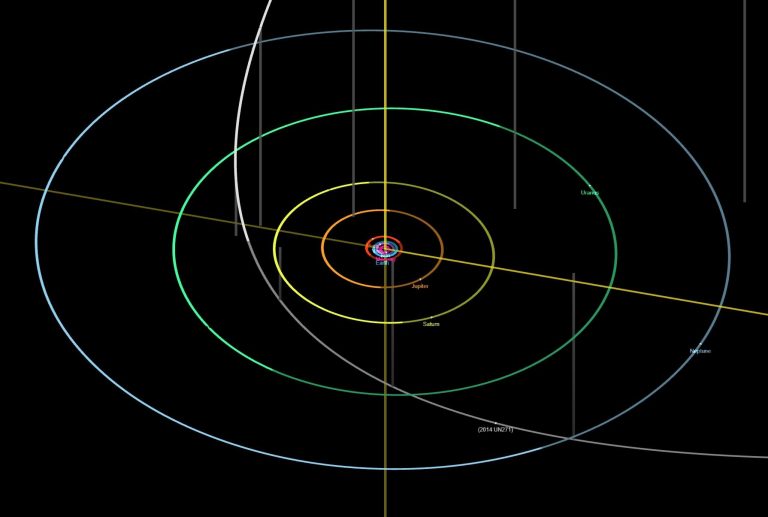
Top 10 Astronomy News Stories of 2023
This year, we heard the low hum of gravitational waves criss-crossing the cosmos, observed a "ring of fire" solar eclipse, and applauded the arrival of asteroid samples. Here are Sky & Telescope's picks for the top news stories in astronomy this year.

Astronomy in Space with David Dickinson
As an Asteroid-Hunting Mission Approaches Its End, What's Next?
The pioneering NEOWISE observatory celebrates a milestone, even as the end of the mission draws near.

Amateur Astronomers Discover an Asteroid’s Moon
The small object orbiting around main-belt asteroid 5457 Queen’s is the second confirmed asteroid moon discovered during a stellar occultation.

Comet 46P/Wirtanen: All Dust, No Ice
Where is all of the water around hyperactive comets coming from? A recent article asked if it could be “Ice, Ice, Maybe?” and concluded that it likely isn’t.

Are We Finally on the Cusp of Commercial Asteroid Mining?
Years after initial space-mining ventures went bust, startup AstroForge has announced two missions in 2023 to obtain rare minerals from a near-Earth asteroid.

How Many Moons Can an Asteroid Have?
The discovery of the first quadruple asteroid system raises the question: Is there a limit to how many moons an asteroid can have?

Samples from Asteroid Ryugu Are Most Primitive Material We've Found
The material that the Hayabusa 2 spacecraft returned from asteroid Ryugu is the most pristine sample we've ever gotten our hands on.

NASA Launches Lucy Mission to Trojan Asteroids
NASA’s ambitious Lucy mission has launched to explore Jupiter's Trojan asteroids, pristine examples of the solar system's early years.

Astronomy in Space with David Dickinson
Astronomers Discover Asteroid that Flies Close to the Sun
Newly discovered asteroid 2021 PH27 orbits the Sun in just 113 days.

Two Extremely Red Asteroids Discovered Far from Home
Astronomers have discovered the two reddest objects in the asteroid belt, and their origin story might tell us more about planet formation.

Giant Oort Cloud Comet Lights Up in the Outer Solar System
Astronomers have discovered a new comet coming from the Oort Cloud — and it appears to be a big one.

Iron Volcanos: Maybe Not Science Fiction After All
A new study of asteroid 16 Psyche suggests that ferrovolcanism, volcanoes that spewed molten iron, might have been present on this object.

Comet NEOWISE Delights at Dawn
Skywatchers are treated to a naked-eye comet as NEOWISE emerges into the the dawn sky.

Exploring Links Between Nearby Asteroids
In preparation for the launch of Destiny+, a new study reveals that two near-Earth asteroids may share the same parent.

Jupiter Has Trapped a Comet in a Bizarre Orbit
Jupiter has captured an icy comet from the outer solar system. The comet's bizarre orbit will bring it back for another super-close pass in 2063.

Explore the Night with Bob King
Sky Surprises: New Comet ASASSN1, Nova in Scutum, and Supernova in Pisces!
Between the discovery of the new comet ASASSN1 and two stellar explosions, there's a lot happening in the sky this week. Take your telescope out and see what all the excitement's about.

Bright Prospects for Comets in 2017
Comet lovers have much to look forward to in the new year with six potential bright binocular comets and at least two others for modest backyard telescopes.

Explore the Night with Bob King
Catalina Comet Sails Into Northern Skies
Comet Catalina returns this month with naked-eye potential. Follow its every move with our guide and maps.

Asteroids: What Are They and Where Do They Come From?
Asteroids are rocky objects leftover from the solar system's formation, found primarily in the asteroid belt, a region of the solar system in between the orbits of Mars and Jupiter.

Comets: What Are They? Where Do They Come From?
Comets are suspected to be remnants of planet formation in the solar system about 4.6 billion years ago and primarily originate in the Kuiper Belt and the Oort Cloud.
